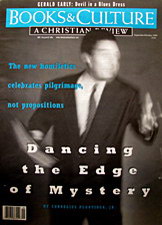• INTELLECTUM VERO VALDE AMA • Greatly love the intellect
—Augustine
In a lecture delivered at the University of Notre Dame in October 1998 for the eighth annual national conference of the Lilly Fellows Program in the Humanities and the Arts, Nicholas Wolterstorff sketched what might be called an ethics of reading: “If the Christian is going to engage in that practice of our common humanity which is called scholarship, then he is thereby under obligation to honor his fellow participants by understanding as well as he can how they are thinking and where, to put it colloquially, they are ‘coming from.’ ” Wolterstorff adds that this is a point he makes to his students “once a week” or so, and then he amplifies it:
Thou must not take cheap shots. Thou must not sit in judgment until thou hast done thy best to understand. Thou must earn thy right to disagree. Thou must conduct thyself as if Plato or Augustine, Clement or Tertullian, were sitting across the table—the point being that it is much more difficult (I don’t say impossible) to dishonor someone to his face.
Not only scholars but all Christians engaged in the life of the mind should post these rough-and-ready “commandments” in a prominent spot. (Wolterstorff’s lecture, entitled “Tertullian’s Enduring Question,” appears in The Cresset, Trinity [June/July] 1999.)
Genuine engagement entails both an effort to internalize the arguments of opposing viewpoints, understanding them from the inside, and an effort to examine one’s own position from the outside, testing it for weaknesses. (These two necessary steps are represented, for example, in the Scholastic method of disputatio, as practiced by Aquinas.) On both counts, most arguments fail miserably, whether the subject is U.S. policy in Kosovo or the best place to stack dirty dishes—in the sink, as some contend, or on the counter? (The latter, of course, is the position endorsed by BOOKS & CULTURE.)
One way to put it would be to say that many arguments are deeply flawed by a lack of imagination—imagination that allows a person to step outside herself, so to speak. Consider, for example, a comment made by the philosopher Robert Pennock, author of Tower of Babel: The Evidence Against the New Creationism (MIT Press), in his rejoinder to Phillip Johnson in this issue (see p. 31). Pennock reports that when he gave an advance copy of Johnson’s article to his students, they noted—among other flaws—the ways Johnson “substituted rhetoric for argument.” This is odd coming from a philosopher of Pennock’s caliber, because it implies that there is an easily distinguishable line between rhetoric and argument. Surely, it seems, Pennock must be aware of the extent to which his own argument in Tower of Babel incorporates a panoply of rhetorical strategies. And these are not incidental, merely decorative, adding a final twist to an argument already essentially clinched. On the contrary—and quite unremarkably—rhetoric plays a crucial role in his project.
For example, Pennock repeatedly characterizes the “new creationists,” and in particular those who argue for intelligent design, in conspiratorial terms. This tone is picked up in the dust-jacket copy and the endorsements as well, as in these words from the prominent biologist Douglas Futuyma: “Adopting new strategies and new disguises, creationists continue to assault not only evolutionary biology, but the foundations of science as well.” Pennock notes that four younger members of the intelligent-design camp, whom he refers to as the “four horsemen”—William Dembski, Paul Nelson, Stephen C. Meyer, and Jonathan Wells—”have dedicated their lives to their cause and have been collecting multiple graduate degrees (Dembski in mathematics, philosophy, and theology; Meyer and Nelson in philosophy; and Wells in religious studies and molecular and cellular biology) so they will be fully armored and ready to ride forth.” Collecting multiple graduate degrees, are they? Those creationists are a crafty lot!
Another notable example is the way in which Pennock psychologizes his opponents (a frequent tactic in argument these days). Turns out that at bottom what’s motivating the creationists is fear. They are afraid that an evolving universe is a universe leached of meaning, a prospect so terrifying that it has addled their wits. The remedy Pennock proposes is a sort of philosophical therapy.
It’s tempting to go on with more examples. How delicious, for instance, to see Pennock giving Alvin Plantinga a scolding for “attempts to turn back the clock”; that settled Plantinga’s hash! But the point is made. Pennock needs to do what we all need to do: step outside himself for a minute and examine his own rhetoric. (I should add that when I met Rob Pennock recently at a science-and-religion conference at MIT, we had several good conversations, and I have profited a good deal from reading his book, as I hope to make clear in our next issue, in considering his treatment of the analogy between biological evolution and linguistic evolution.) And then back to the fray.
Copyright © 1999 by the author or Christianity Today/Books & Culture Magazine. Click here for reprint information on Books & Culture.









